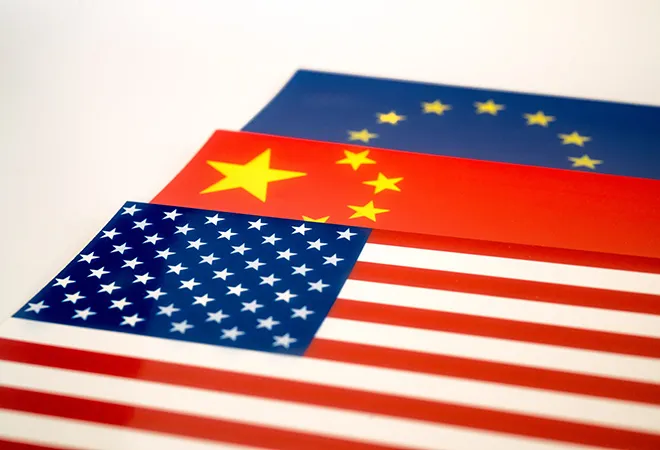-
CENTRES
Progammes & Centres
Location

On 19 May, the European Parliament adopted a resolution freezing “any consideration of the EU-China Comprehensive Agreement on Investment (CAI), as well as any discussion on ratification”. At the same time, the European Parliament suggested a strengthened European Union (EU) Foreign Investment Screening Regulation, legislation on foreign subsidies, and other measures directed against China. It also called on the EU “to increase its coordination and cooperation with the US within the framework of a Transatlantic Dialogue on China.” How did it come to this?
Last December, the EU had reached political agreement with China on a new Comprehensive Agreement on Investment (CAI), to improve access to the Chinese market for European companies. Chinese companies already enjoy largely free access to the European market. The EU rushed to conclude the deal in the last days of the Trump administration in the US, without waiting to work together with the new US administration. Chinese President Xi Jinping intervened personally and made the final concessions necessary to secure the bilateral deal between China and the EU, thus, driving a wedge between the EU and the US.
According to its 2019 Strategic Outlook on China, the EU identifies China with three different labels: As a partner (for example, on climate change), a competitor (for example, on trade) and a systemic rival (on values and governance). The EU still follows this policy, although the 19 May European Parliament resolution remarked, “The existing EU-China Strategy has revealed its limitations”. The EU has been reluctant to side with the US against China across the whole range of policy issues. It has been keen to benefit from Chinese trade and investment, fueled by China’s sustained economic growth. The CAI was a part of this outlook.
The EU has been reluctant to side with the US against China across the whole range of policy issues. It has been keen to benefit from Chinese trade and investment, fueled by China’s sustained economic growth. The CAI was a part of this outlook.
Given this “multi-faceted” approach, the EU saw no contradiction on 22 March 2021, when it switched to the “systemic rival” facet and imposed sanctions on four Chinese individuals and one entity involved in repression of Uighurs in Xinjiang, in a coordinated move with the US and other partners. However, China did not take this well. Beijing reciprocated promptly and disproportionately on the same day, with a raft of sanctions on 10 EU individuals and four entities, including diplomats, members of Parliament of all political factions, think tanks, and researchers. As the European Parliament noted, the Chinese sanctions are not based on international human rights law but are a purely political reprisal. These Chinese counter-sanctions prompted the European Parliament to issue its resolution.
After 22 March, Beijing pulled out all the stops against the Europeans, as Chinese official statements and state media irately called the Germans ‘Nazis’ and ‘genocidal murderers of Namibians’, then accused all of Europe of being racist. Years of carefulness was replaced by a level of nastiness from Beijing that Europeans had not noticed before.
Sanctioning two think tanks demonstrated that Beijing punishes freedom of thought and speech, if it does not like what it hears. Europe got a glimpse of what the future would look like under the Chinese Communist Party (CCP). What is happening in Hong Kong could happen in Europe one day, incrementally, if people chose to be willfully blind to attacks on democracy, values, and the very fabric of the EU.
One aspect of the CAI particularly incensed the members of the European Parliament, as it emerged that one of the annexes stipulated that European non-governmental entities in China, including the German political foundations such as the Konrad Adenauer Foundation or the Friedrich Ebert Foundation, would have to be headed by Chinese nationals. The European Commission had not informed Parliament of this stipulation. This caused mistrust between the two institutions.
Opinion polls across Europe show a sharp deterioration of opinion on China. However, France’s President Macron and Germany’s Chancellor Merkel remain silent, giving priority to economic considerations over human rights.
In the meantime, the German Parliament is discussing due diligence legislation that would prohibit German companies from investing in locations like Xinjiang, where human and labour rights are not respected. It aims to adopt these norms before the end of the current legislature in September. Other European countries are also working on such legislation or have it already in place.
The 19 May European Parliament resolution asked the European Commission to draft an EU-wide supply-chain legislation with mandatory due diligence requirements, including an import ban on forced labour goods. In the past, China has obliged European companies that wanted to do business with China to invest in Xinjiang. For instance, Volkswagen opened a plant in Urumqi. After due diligence rules are in place, European companies would no longer be able to comply with such requests.
The German elections in September could bring a big political change. Merkel will retire after 16 years in power and could be replaced by the leader of the opposition Green Party, Annalena Baerbock, who takes a more critical view of China. This would have an impact also at the EU level. Gone could be the “multi-faceted”, “muddle-through”, and “business first” approach based on various issue baskets, in favour of a stronger connection between values and interests, and a closer alignment with US policy toward China.
On 20 May, China’s official Party mouthpiece, Global Times, thundered against the European Parliament resolution of the previous day, and noted, “This is a flaw of the EU; it is incapable of fully complying with the rules.” It suggested that the EU is an unreliable economic partner, because it may subject an issue to “political considerations.” It pointed out, “By dancing to the US’ tune, the EU is destroying its most important economic cooperation agreement with China. It is sacrificing its interests for the goal of the US.”
In fact, through its actions, and particularly though it counter-sanctions of 22 March, China pushed the EU into the arms of the US. The jury is out on the reasons for China’s decision to impose such disproportionate sanctions hitting the whole range of the European political spectrum. Playing to the Chinese domestic audience may have played a role. However, everything considered, the move appears to be rather a miscalculation.
The European Parliament will not resume work on the CAI unless the Chinese sanctions are lifted, which, in turn, depends on the EU sanctions being lifted. However, the EU cannot justify lifting its sanctions unless there is a change in the human rights situation in Xinjiang, which is unlikely. So, there is a complete blockage on the agreement.
The European Parliament will not resume work on the CAI unless the Chinese sanctions are lifted, which, in turn, depends on the EU sanctions being lifted. However, the EU cannot justify lifting its sanctions unless there is a change in the human rights situation in Xinjiang, which is unlikely. So, there is a complete blockage on the agreement.
On the other hand, EU and US officials started coordinating their positions on China more closely; for instance, with the 5 May meeting between EU High Representative Joseph Borrell and US State Secretary Antony Blinken. On 26 May, EU and US senior officials will hold the first meeting of a new EU–US dialogue on China, in which they will discuss in detail their China policies across all issue areas. Ultimately, with the CAI, China shot itself in the foot, or, to borrow Mao Zedong’s phrase, it was like “lifting a heavy rock only to drop it on one’s feet”.
The views expressed above belong to the author(s). ORF research and analyses now available on Telegram! Click here to access our curated content — blogs, longforms and interviews.

Theresa Fallon is the founder and director of the Centre for Russia Europe Asia Studies (CREAS) in Brussels. She is concurrently a member of the ...
Read More +